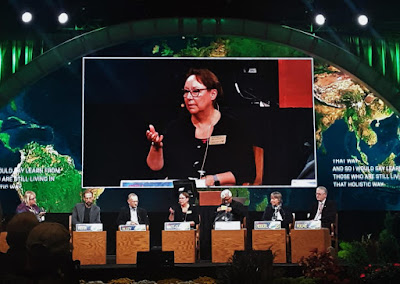The Right to Be Cold
"If there's anything that you take away today, I want you to understand that human trauma and planet trauma are one and the same." As Sheila Watt-Cloutier, or Siila as she likes to be called, exited the stage, she was sent off by the uproarious applause of over 3,000 people. And then after a brief moment, each and every one of us began to stand in ovation and yell out in encouragement. The Inuit activist's speech certainly left a large lump in my throat. As a matter of fact, I don't think I would be wrong in assuming that her message left us all feeling a bit overwhelmed by emotion. That emotional impact of such powerful speeches persisted throughout those two days that my coworkers and I were away from the office. It was the Nobel Conference, after all.
 |
| Sheila (Siila) Watt-Coultier sat on the panel of speakers after her speech titled Everything is Connected: Environment, Economy, Foreign Policy, Sustainability, Human Rights and Leadership in the 21st Century. Speakers addressed a "Climate Changed" during the 55th Nobel Conference in St. Peter, Minnesota. |
Siila shared her concern for human rights--the right for Inuit children to grow up living on the ice as their parents and grandparents had, the right to a healthy environment to live in, the right to learn from their icy community--struck the crowd as important and meaningful. So did the concern of Richard Alley who urged us to be as concerned as he was about a changeable climate in an era of unfathomable human impact on the planet. This changeable, and certainly already changed, climate is one that Gabriele Hegerl further urged us to understand as one that may very well show us our limits of adaptation.
It was a scary scene at times--graphs of CO2 emissions, metrics of rising global temperatures, and too many complex visuals were plastered on the bright screens throughout the presentations as a means to show us that this is a big deal! But that sobering message didn't leave me with a sense of doom for our future.
As I sat among the crowd of professionals, science geeks, nature lovers, and surprisingly numerous students at what our benefactor described as a "uniquely accessible" conference, I experienced nearly every point on the spectrum of human emotion. The great scientific minds who spoke to us on a Climate Changed led us to laugh, ponder, become increasingly enraged, heartbroken, and even imaginative. Every bit of that experience and the knowledge gained within it is, most importantly, empowering.
 |
| We three (Mollie, Leslie, Emily) were delighted and ever-appreciative that a Museum member helped us to have this unique opportunity. |